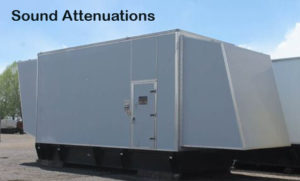
Most industrial and manufacturing plants want to stay compliant with their various local noise ordinances by investing in credible noise barriers that can effectively reduce offensive sounds. Noise pollutions can affect the environment and its catchment in very devastating ways such as causing heart diseases. Moreover, employee safety and equipment regulations in workplaces require companies to keep excessive noise to a minimum.
Some of the notable causes of offensive outdoor sounds include gas compressor stations, generators, traffic from roads, big box stores, airports, learning institutions, sports arenas, shopping malls, construction sites, and bus terminals among others.
Weighty effects of excessive noise
Unwanted noise can cause heart diseases. The NIH recommends that businesses and manufacturing plants should implement techniques like using sound walls to prevent deaths associated with such heart diseases. This is very critical considering that technology has brought about the development of mobile devices like cell phones that are capable of producing over 85 decibels of noise. That is the level at which a person can lose the ability to hear.
According to the Environmental Protection Agency, noise caused by huge commercial equipment exposes the general public to certain health dangers. People who are constantly exposed to offensive noise develop weird mood swings and irregular sleeping patterns. In the long run, these negative effects can cause problems such as random outbursts, regular bickering, inability to pay attention, blood pressure, and even the potential for death.
How to minimize noise
There are various noise mitigation methods that are being applied by different companies in various industries to control noise. Newer technologies that enhance sound absorption instead of just bouncing the sound around like reflective barriers are more effective.
The noise trapping capabilities of these system work by absorbing the sound, dampening it with specialized noise dampening materials, and releasing it with a lesser impact. The sound wall controllers are called absorptive noise barriers because they absorb sound waves effectively without reflecting them as traditional concrete walls used for constructing perimeter walls in most manufacturing plants or businesses in various industries.
Advantages of using sound-absorbing walls
- It improves the ability of employees to communicate with each other and their supervisors at their respective workstations.
- Reduce the effects of offensive sound on neighbors.
- Stay compliant with the local noise ordinances.
- Prevent affecting the normal lifestyle of the local wildlife and habitats.
- Minimize health conditions associated with offensive noise such as irritability, heart diseases, and stress.
- Improve the overall mood of employees and neighboring ecosystems.
Mitigating offensive noise to improve environments
The National Institute of Health concurs that the longer an individual is exposed to excessive noises, the more damage happens. A person who stay closer to excessive noise will be affected more than the one who stays far. Since it’s almost impossible to stay away from certain noises like the highway or train tracks, something ought to be done to improve habitats and protect the general public against noise pollution.
Absorptive barriers are perfect for reducing noises that come from traffic along Interstates or major thoroughfares. Reduction of excessive noises near or in residential areas will make people feel more comfortable in spending most of their time outdoors. Families can enjoy a walk to the park if well-designed absorptive sound wall barriers are installed to reduce noise pollution.
